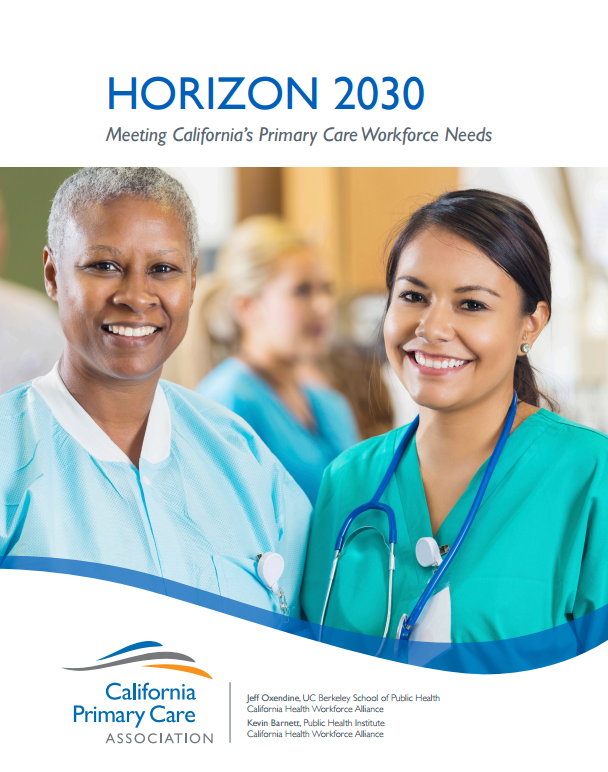
In the News
CPCA releases new workforce study highlighting opportunities for California
-
Issues
Workforce Development
The California Primary Care Association (CPCA), which represents community health centers who provide care to 1 in 7 Californians, released a report today which provides a sobering analysis of California’s healthcare workforce today while detailing key opportunities to meet the workforce needs of tomorrow.
The report, titled “Horizon 2030: Meeting California’s Primary Care Workforce Needs,” was commissioned by CPCA and authored by health workforce researchers Jeff Oxendine, who is Associate Dean for Public Health at the UC Berkley School of Public Health, and Kevin Barnett, a Senior Investigator at the Public Health Institute.

The report’s name comes from a striking statistic shared early in the report: “At current utilization, California will need an estimated 8,243 additional primary care physicians by 2030, or 32% of its current workforce (Pettersone, Cai, Moore, & Bazemonre, 2013).” The report also notes that California’s ratio of primary care physicians participating in Medi-Cal is approximately half of the federal recommendation.
“While our current situation is very concerning, Horizon 2030 provides California with a clear roadmap that is full of common sense solutions,” said Castellano-Garcia. “If we come together and think about what is best for the communities we serve, we can solve the problem. It’s that simple.”
Horizon 2030 focused on five components that included Career Awareness and Education, Residencies and Graduate Medical Education Funding, Primary Care Transformation and Financing Innovations, Recruitment and Retention, and State and Regional Strategies and Infrastructure. The Executive Summary provides nine overarching priority recommendations, with more specific recommendations in each section.
Workforce is a top priority for CPCA. It has become clear to health centers across California that we cannot deliver on the promise of healthcare access if we do not have a robust workforce capable of providing the timely, culturally competent, high quality care our patients deserve.
CPCA has already embarked on the primary care workforce journey. Last year, Governor Jerry Brown signed Senate Bill 147 (Hernandez) into law. The bill, which was sponsored by CPCA and highlighted as a Horizon 2030 priority recommendation, authorizes a three-year demonstration project which provides Federally Qualified Health Centers operational and reimbursement flexibility to use new team-based primary care models.
This year, CPCA is exploring legislation to expand the mental health provider workforce, strengthen care teams, and create state solutions that support and increase primary care residency programs at teaching health centers. At the federal level, CPCA is a proud member of the Save Our Teaching Health Centers coalition being led by the American Association of Teaching Health Centers and the Association of Clinicians for the Underserved which advocates in support of the National Health Service Corps.
Originally published by State of Reform
More Updates
Work With Us
You change the world. We do the rest. Explore fiscal sponsorship at PHI.
Support Us
Together, we can accelerate our response to public health’s most critical issues.
Find Employment
Begin your career at the Public Health Institute.



